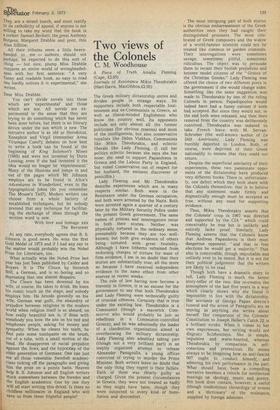Two views of the Colonels
C. M. Woodhouse
A Piece of Truth Amelia Fleming (Cape, £2.95) Journals of Resistance Mikis Theodorakis (Hart-Davis, MacGibbon,£2.95) The Greek military dictatorship unites and divides people in strange ways. Its supporters include both respectable businessmen and ex-Communists in Greece, as well as liberal-minded Englishmen who know the country well. Its opponents include not only almost all the former politicians (for obvious reasons) and most of the intelligentsia, but also conservative royalists like Helen Vlakhos, Communists like Mikis Theodorakis, and eclectic liberals like Lady Fleming. (I call her politics eclectic because she says she has none: she used to support Papandreou in Greece and the Labour Party in England, but voted Conservative out of respect for her husband, the eminent discoverer of penicillin.) Lady Fleming and Mr Theodorakis describe experiences which are in many respects similar. Both were in the Resistance under the German occupation, and both were arrested by the Nazis. Both were arrested again a quarter of a century later by the Military Security Police under the present Greek government. The same names of prisons and interrogators recur in both their stories. Neither was physically tortured in the ordinary sense, presumably because they are too wellknown; but both give evidence of others being tortured with great brutality. Although I have hitherto refrained from endorsing charges of torture for want of firm evidence, I am in no doubt that their stories are substantially true, all the more so because I have received independent evidence to the same effect from other sources in recent weeks.
The rule of law having now become a travesty in Greece, it is no excuse for the government to say that both Theodorakis and Lady Fleming were technically guilty of criminal offences. Certainly that is true under the existing law. Theodorakis is a Communist (though a maverick Communist who would probably be just as rebellious in a Communist-controlled Greece); and he was admittedly the leader of a clandestine organisation aimed at overthrowing the military dictatorship. Lady Fleming also admitted taking part (though not a very brilliant part) in an ineptly organised attempt to release Alexander Panagoulis, a young officer convicted of trying to murder the Prime Minister. Both writers leave no doubt that the only thing they regret is their failure. Each of them was Clearly guilty as charged. Given the present circumstances in Greece, they were not treated as badly as they might have been, though they were subjected to every kind of humiliation and discomfort. The most intriguing part of both stories is the obvious embarrassment of the Greek authorities once they had caught their distinguished prisoners. The most celebrated of Greek composers and the widow of a world-famous scientist could not be treated like common or garden criminals. Their interrogations were sometimes savage, sometimes pitiful, sometimes ridiculous. The object was to persuade them to recant their foolish prejudices and become model citizens of the " Greece of the Christian Greeks." Lady Fleming was offered the choice of two different posts in the government if she would change sides. Something like the same suggestion was made to Theodorakis by one of the ruling Colonels in person. Papadopoulos would indeed have had a funny cabinet if both had, accepted. But since they wouki not, in the end both were released, and then their removal from the country was deliberately contrived. Theodorakis was induced to take French leave with M. ServanSchrieber (the well-known author of Le Deli A mericain), , Lady Fleming was forcibly deported to London. Both, of course, were deprived of their Greek nationality to ensure that they could not return.
Despite the superficial similarity of their experiences, these two passionate opponents of the dictatorship have produced very different books. There is, unfortunately, one defect which they both share with the Colonels themselves: that is to believe that any statement made firmly and dogmatically enough must be accepted as true, without any need for supporting evidence.
Thus, Mikis Theodorakis asserts that the Colonels' coup in 1967 was directed and supported by the CIA " which could conceivably be true but is unlikely and entirely lacks proof. Similarly Lady Fleming asserts that the Colonels know that Andreas Papanderou is their most dangerous opponent, "and that in free elections he would get a majority." That also is conceivable, though improbable and unlikely ever to be tested. But it is not for their political judgement that the writers are likely to be read.
Though both have a dramatic story to tell, Lady Fleming is much the better story-teller of the two. She re-creates the atmosphere of the last five years in a way which clearly shows why she found it impossible to live with the dictatorship. Her accounts of George Papan drecou's funeral and the arrest of Panagoulis are as moving as anything she writes about herself. Her comparison of the Colonels' Constitution to Joseph Heller's Catch 22 is a brilliant stroke. When it comes to her own experiences, her writing would not disgraczi Solzhenitsyn. She is simple, impulsive and warm-hearted, whereas Theodorakis by comparison is selfconscious and pretentious. He seems always to be imagining how an anti-fascist 007 ought to conduct himself, and admiring his own performance in the part. What should have been a. compelling narrative becomes a vehicle for intellectual musings on ideology, music and poetry. His book does contain, however, a useful (though tendentious) chronology of events and a 'dictionary' of the resistance, supplied by foreign admirers.


































 Previous page
Previous page